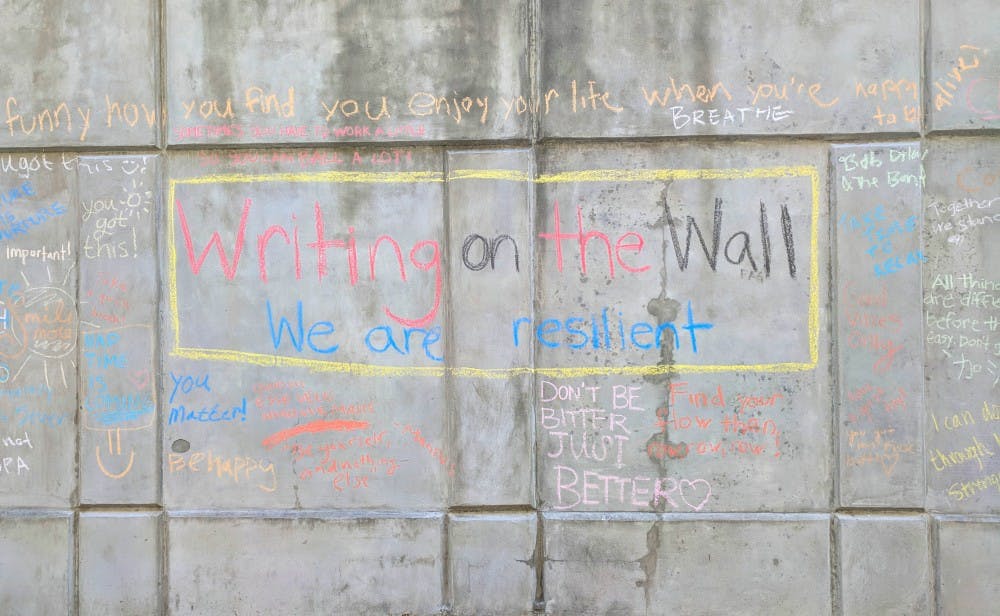Students signing up for the Survey of Abnormal Psychology class in previous semesters thought they'd be studying serial killers. Instead, it was a class on mental health conditions such as depression, anxiety and bipolar disorder.
“For me to stand in front of a group of students and know that at least 25 percent of them are diagnosed with something and we’re calling it abnormal didn’t seem right,” professor Rhea Merck said.
For the honors course, students design a project to help fight mental health stigmas on campus. A former class lobbied the university for a name change; this academic year, the class appears as Behavioral and Mental Disorders in the USC bulletin for the first time.
More than 15 percent of USC students are diagnosed with or treated for depression, and 20 percent for anxiety, according to the spring 2017 National College Health Assessment Survey. But neither of those numbers reflect the true breadth of students’ struggles with mental health. More than 60 percent reported feeling overwhelming anxiety in the past 12 months, and 55 percent reported more than average or tremendous amounts of stress. And all these figures have gone up between five and 12 percent in the past seven years.
As Student Health Services staff members tackle the challenge of mental health, they have to consider stigma reduction and the ever-present struggle for awareness. Before students can take advantage of services offered, they first have to understand the conditions they’re dealing with and not be afraid of the stigma associated with treatment.
From the perspective of Rebecca Caldwell, USC's director of strategic health initiatives, mental health should become a normal part of self-care and enter everyday conversation. Included under her mantle are projects like the Mental Health Matters campaign, featuring students who talk on video about their personal stories.
“We really are trying to push the campus community to think about your mental health as something you maintain and focus on maintaining just as much as you focus on maintaining your physical health,” Caldwell said.
Students in the Behavioral and Mental Disorders class said that the Mental Health Matters videos were great. They’d just never seen them before taking the class. A senior in the class said he’d never heard about the 10 free counseling sessions, one of the major promoted services of Student Health.
That’s a job for Marjorie Duffie, the public relations and marketing director for Student Health Services. Duffie produces campaigns to increase awareness about the services provided on campus, from posters around campus to tables on Greene Street. Student Health frequently collaborates with other university departments to spread the word, like having the weekly campus-wide email include Student Health events.
But students are traditionally a difficult population to reach. She’s gone on class visits and surveyed students about where they get information — overwhelmingly they say friends and Twitter, both not necessarily the most accessible to a traditional public relations approach. The USC Student Health Twitter account, @UofSCshs, only has about 2,300 followers.
“This is why you don’t know about us,” Duffie said. “Because all the ways we can put information out there, you're not paying attention."
With students relying on friends for information and help, student initiatives have the possibility to reach out in a different way from Duffie and adults at Student Health.
Third-year experimental psychology student Katie Cohen, the Student Government secretary for health and wellness, led Stigma Free USC Week on campus to increase awareness of mental health conditions as well as advertise the places students can seek help. Partnered with Cohen was Kaitlin Harrison, the president of Active Minds, a student organization focused on mental health awareness. Over 700 students attended the events during the week of Oct. 9.
“If we have this culture of people who are willing to talk about it,” Cohen said, “then when somebody else starts feeling it, they’re not going to think that it’s necessarily abnormal.”
Cohen and Harrison have both dealt with anxiety and depression from an early age. Since personally experiencing the isolating effects of mental illnesses, Harrison has been driven to help other people dealing with the same issues.
“People are nervous because they don’t really know a lot about it and that’s what we want to do is just educate people,” Harrison said.
Cohen is pushing for a universal student education on mental health issues and how to speak to friends about issues like depression and suicide, similar to the Alcohol EDU and Haven programs currently required for incoming freshmen. While services offered by Student Health are good, she said, most students will go to their friends first.
Duffie said that the program proposed by Cohen, called Kognito, is good, but she is reluctant to add another requirement for freshmen, something that can add stress and another deadline to the already hectic freshman experience.
Students in the mental health class agreed that stigmas among peers are a still an issue, including a culture of living with high stress and pressure to always be social.
“Peers are with you all the time even when you’re not in school,” one student said about having a mental illness. “If you can’t tell your peers, you’re in a trap that’s there all the time.”

